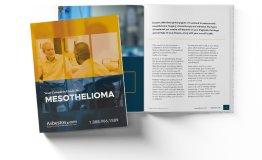
Talc Lawsuits Involving Asbestos & Mesothelioma
Asbestos-contaminated talc has caused many cases of mesothelioma cancer. Companies who exposed workers to contaminated industrial talc or consumers to unsafe baby powder are liable in personal-injury and wrongful-death lawsuits. Plaintiffs have won millions of dollars in jury verdicts and settlements.
Written by Daniel Wasserberg • Edited By Walter Pacheco
Asbestos.com is the nation’s most trusted mesothelioma resource
The Mesothelioma Center at Asbestos.com has provided patients and their loved ones the most updated and reliable information on mesothelioma and asbestos exposure since 2006.
Our team of Patient Advocates includes a medical doctor, a registered nurse, health services administrators, veterans, VA-accredited Claims Agents, an oncology patient navigator and hospice care expert. Their combined expertise means we help any mesothelioma patient or loved one through every step of their cancer journey.
More than 30 contributors, including mesothelioma doctors, survivors, health care professionals and other experts, have peer-reviewed our website and written unique research-driven articles to ensure you get the highest-quality medical and health information.
About The Mesothelioma Center at Asbestos.com
- Assisting mesothelioma patients and their loved ones since 2006.
- Helps more than 50% of mesothelioma patients diagnosed annually in the U.S.
- A+ rating from the Better Business Bureau.
- 5-star reviewed mesothelioma and support organization.
Testimonials
My family has only the highest compliment for the assistance and support that we received from The Mesothelioma Center. This is a staff of compassionate and knowledgeable individuals who respect what your family is experiencing and who go the extra mile to make an unfortunate diagnosis less stressful. Information and assistance were provided by The Mesothelioma Center at no cost to our family.LashawnMesothelioma patient’s daughter
How to Cite Asbestos.com’s Article
APA
Asbestos.com. (2024, March 5). Talc Lawsuits Involving Asbestos & Mesothelioma. Retrieved April 19, 2024, from https://www.asbestos.com/mesothelioma-lawyer/lawsuit/talc/
MLA
"Talc Lawsuits Involving Asbestos & Mesothelioma." Asbestos.com, 5 Mar 2024, https://www.asbestos.com/mesothelioma-lawyer/lawsuit/talc/.
Chicago
Asbestos.com. "Talc Lawsuits Involving Asbestos & Mesothelioma." Last modified March 5, 2024. https://www.asbestos.com/mesothelioma-lawyer/lawsuit/talc/.
Talc and Asbestos Contamination
Talc is the softest mineral on Earth, and manufacturers use it in a variety of products. Talc is a common ingredient in paints, ceramics and many construction and farming materials. Finely crushed talc is a popular personal hygiene product, sometimes used to make baby powder.
Asbestos naturally occurs in many talc deposits. When people inhale contaminated talc dust on a regular basis, toxic asbestos fibers may accumulate in the lining of their lungs. Over many years, this can cause aggressive diseases such as ovarian cancer, lung cancer and mesothelioma.
Talc Lawsuit Facts
- Exposure to asbestos-contaminated talc can cause cancer.
- Legal compensation is available through lawsuits.
- Multimillion-dollar settlements and verdicts have been awarded.
- Experienced mesothelioma lawyers are essential.
Before the dangers of asbestos were brought to light in the 1970s, companies using talc were not concerned with asbestos contamination. Even after the government began to regulate asbestos, the talc industry was left to police itself. People had to simply trust companies to use asbestos-free talc.
Unfortunately, asbestos-related diseases have a very long latency period, so it took decades for cancer diagnoses to reveal the talc industry’s negligence.
Asbestos-contaminated talc has repeatedly been a major source of toxic exposure for American workers and consumers.
Mesothelioma Lawyers for Talc Lawsuits
It is challenging to hold a company accountable for asbestos exposure when that company did not officially make or use asbestos products. A person’s best hope of receiving compensation for their injuries is to work with an experienced mesothelioma attorney.
Mesothelioma is a rare form of cancer that is almost exclusively caused by asbestos exposure. Historically, the people most at risk were men who spent their careers working with asbestos products such as insulation or cement.
But in recent years, the incidence of mesothelioma began to rise among people with no apparent connection to the asbestos industry. In many cases, these people had one thing in common: They used talcum powder on a daily basis.
Since making that connection, law firms specializing in asbestos cases have found success getting mesothelioma patients and their families the legal compensation they deserve.
Connect with a Top Mesothelioma Attorney
Only a qualified attorney can determine if you are eligible and help you seek the mesothelioma compensation you deserve.


Mesothelioma Lawsuits Over Industrial Talc
Industrial talc lawsuits brought by mesothelioma patients have gone to trial in the U.S. for nearly two decades. They’ve primarily involved talc suppliers R.T. Vanderbilt Company Inc. (also known as Vanderbilt Minerals) and Imerys Talc America.
Vanderbilt Minerals
Vanderbilt settled a mesothelioma lawsuit filed by Robert Lord in 2018 while a Florida state court jury was deliberating. In the 1970s, Lord worked with ceramic tiles made from asbestos-contaminated industrial talc.
Lord filed suit in 2017 against several defendants, including Vanderbilt Minerals. By the time the case went to trial in February 2018, Vanderbilt was the only remaining defendant. The settlement amount was not disclosed, but Lord had been seeking up to $11.5 million in damages.
In 2012, the family of Richard Chisholm filed a mesothelioma talc lawsuit against Vanderbilt. In the 1970s, Chisholm used Vanderbilt’s industrial talc to make ceramic products.
Chisholm was diagnosed with mesothelioma in 2010 and died in 2012. A New York Supreme Court jury found Vanderbilt at fault and awarded $10.55 million to Chisholm’s family.
Imerys Talc America
A California jury in 2017 awarded $22.17 million to Richard Booker. He used asbestos-containing industrial talc to make paint while working at Dexter Midland Chemical Co. and Walter N. Boysen Paint Co.
The talc Booker used was supplied by Vanderbilt Minerals and Imerys Talc America. Testimony presented to the jury from Imerys executives revealed the company had reblended its talc in an attempt to hide the asbestos content.
Mesothelioma Lawsuits Over Consumer Talcum Powder
Asbestos talcum powder lawsuits are a more recent development. These cases involve manufacturers such as Colgate-Palmolive and Johnson & Johnson.
In January 2023, J&J’s bankruptcy plan to resolve its talc liabilities was rejected by a federal appeals court. The ruling will bring back nearly 40,000 talc lawsuits to civil courts.
Talc suppliers such as Imerys and Whittaker, Clark & Daniels are also liable.
Avon
In December 2022, a California jury ordered Avon and a forklift company to pay $52.1 million to Rita-Ann Chapman. Her lawsuit claimed that she used talc-based Avon products throughout her life. Chapman claimed exposure to contaminated talc caused her to develop mesothelioma.
Johnson & Johnson
The biggest verdict came in June 2021, when the U.S. Supreme Court rejected an appeal from Johnson & Johnson to overturn a $2.12 billion verdict awarded to 22 women who claim the company’s talcum powder products caused them to develop asbestos-related ovarian cancer. The verdict was reduced from an initial award of $4.7 billion in 2018.
In October 2021, a California jury awarded more than $26 million to Christina Prudencio, who claimed childhood exposure to J&J’s baby powder caused her to develop mesothelioma.
In May 2018, a jury in California awarded $21.7 million to mesothelioma patient Joanne Anderson and her husband. Anderson connected her diagnosis to Johnson’s Baby Powder.
The lawsuit was filed against Johnson & Johnson and several talc suppliers, including Imerys, Cyprus Amax Minerals and Honeywell International.
A month earlier, a New Jersey court ordered Johnson & Johnson and Imerys to pay a total of $117 million to Stephen Lanzo III and his wife. Lanzo’s case was Johnson & Johnson’s first loss in an asbestos-related talcum powder lawsuit.
Lanzo linked his mesothelioma to asbestos in Johnson & Johnson’s Shower to Shower and baby powder products.
J&J has been ordered to pay out billions to plaintiffs who claim the company’s talcum powder products caused them to develop not only mesothelioma but also ovarian cancer.
Whittaker, Clark & Daniels
In 2017, a New York jury ordered Whittaker, Clark & Daniels to pay $16.5 million to Florence Nemeth. She developed peritoneal mesothelioma after using Desert Flower Dusting Powder.
That same year, Colgate-Palmolive opted to settle a mesothelioma talc lawsuit filed by Pennsylvania resident Carol Schoeniger. She used Cashmere Bouquet for more than 20 years. The financial terms of the settlement were not made public.
In 2016, a jury awarded Philip Depoian $18 million in a lawsuit against Whittaker, Clark & Daniels. He had been exposed to the company’s contaminated talc in products at his father’s barbershop and was diagnosed with mesothelioma in 2015.
Colgate-Palmolive
Judith Winkel won $13 million in a 2015 mesothelioma lawsuit against Colgate-Palmolive and four other companies. She used Cashmere Bouquet brand talcum powder from 1961 to 1976 and was diagnosed with cancer in 2014.
Lawsuits over asbestos-contaminated talcum powder should not be confused with lawsuits over pure talc. Many lawsuits have been filed on the basis that pure talcum powder may cause ovarian cancer, but that matter is unsettled at this time.
Talc Lawsuits in the UK
U.K. women have received multimillion-pound awards by filing talc lawsuits in U.S. courts. These lawsuits first hit U.S. courts in 2019.
In 2020, a judge ruled U.S. courts are the best venue for talc lawsuits filed by U.K. residents. The defendants’ principal place of business location in New York affected the ruling. The plaintiff’s purchase of contaminated products while on vacation in the U.S. also played a role.
Lawsuits over asbestos-contaminated talcum powder get confused with lawsuits over pure talc. Many lawsuit filings exist on the basis that pure talcum powder may cause ovarian cancer. But that matter remains unsettled.








